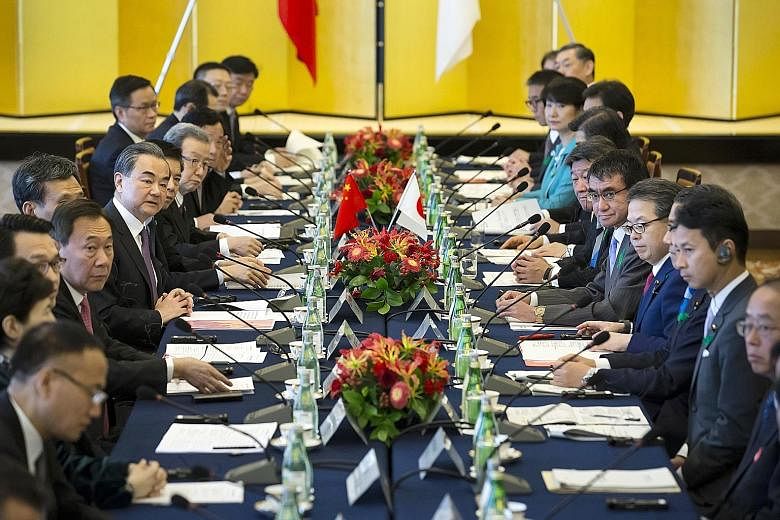China and Japan, Asia's two largest economic powers, yesterday denounced protectionism as they vowed to set aside their traditional rivalry and work closely together to promote free trade and safeguard multilateral trade frameworks.
The pledge by the two countries, at their first high-level economic dialogue since 2010, came as both bear the brunt of protectionist policies by the United States that have threatened to upend the global economic order.
The dialogue was co-chaired by visiting Chinese Foreign Minister Wang Yi and his Japanese counterpart Taro Kono. Mr Wang, who was promoted to State Councillor last month, also briefly met Prime Minister Shinzo Abe yesterday.
"Protectionism is on the rise, placing under severe threat the free trade regime," Mr Wang said in a veiled reference to the US during talks with Mr Abe.
"Actions based on unilateralism are also challenging the fundamental rules of international relations," the Chinese minister added.
Mr Kono, for his part, told reporters: "Japan and China share the common understanding that a trade war will have huge impact on the prosperity of the global economy."
He also said that both countries were keen on holding their next high-level economic talks in China at the "earliest possible date", possibly next year.
"We must have fresh perspectives and think about ways of cooperation and coordination," Mr Kono added.
The US loomed large over yesterday's China-Japan talks, not surprisingly after President Donald Trump railed against both for what he called unfair trade practices.
The two Asian neighbours are targets of US steel and aluminium tariffs, while Beijing is also facing stiff tariffs on US$150 billion (S$197 billion) worth of goods and services. This has prompted retaliatory measures by China.
While Japan and China do not necessarily see eye to eye on all trade matters - Mr Kono said he broached such issues as fair and free transfers of technology, intellectual property exchanges and Chinese steel overproduction - they are prepared to collaborate on a wide range of sectors.
These include energy, environment, science and technology innovation, high-end manufacturing, the sharing economy, finance and banking, and eldercare.
Japan will also work with China on its ambitious Belt and Road Initiative on a project-by-project basis, Mr Kono said.
On trade, they pledged to speed up talks on a bilateral free trade deal, as well as a trilateral pact with South Korea.
They also said they would coordinate closely on the proposed 16-nation Regional Comprehensive Economic Partnership pact, which includes the Asean countries along with Australia, India, New Zealand and South Korea, so as to "unify the East Asian economic area".
China has overtaken the US as the top trading partner for many nations in Asia, including US allies Japan, South Korea and Australia.
The expansion of Sino-Japan economic ties comes as diplomatic relations - which have blown hot and cold since Tokyo effectively nationalised the disputed Senkaku/ Diaoyu islets in the East China Sea in 2012 - are on the mend.
The apparent thaw in ties between Beijing and Tokyo came just one day before Mr Abe was due in Washington for his sixth summit with Mr Trump amid lingering doubts here over the future of the US-Japan alliance.
The Nikkei Asian Review said in an analysis yesterday: "The fact that Japan faces a similar, if less severe, (trade) challenge gives Beijing an opportunity to pull Tokyo closer to its orbit with the economic talks."

